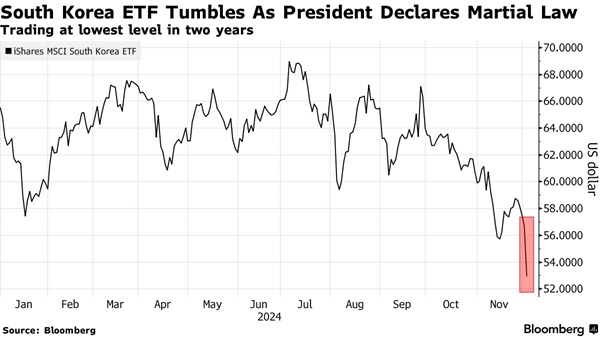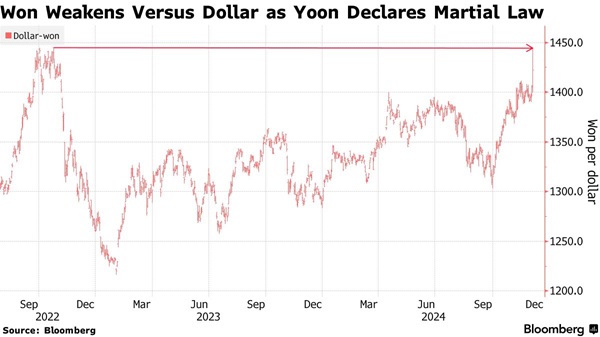South Korea experiences a sudden 'black swan' at night! What happened in South Korea on the night when assets plummeted across the board and the Korean won crashed?
Newspaper (Asia Pacific) News: Late at night on Tuesday (December 3rd) local time, a "black swan" suddenly flew out of South Korea! In an emergency speech broadcasted nationwide on Tuesday, South Korean President Yoon Suk Yeol declared martial law after accusing the opposition of attempting to paralyze his government, shocking voters, lawmakers, and investors.
On Tuesday evening, Yoon Seok yeol made an emergency statement at the Longshan Presidential Palace in Seoul, issuing an emergency martial law order. Yin Xiyue said that this move is to eradicate the "pro North Korean forces" and maintain the "free constitutional order".
South Korean President Yoon Seok Yuet unexpectedly decided to implement the martial law order for the first time in more than 40 years, which led to a sudden collapse of Korean assets listed in the United States, a "flash crash" of the Korean won, and caught the global market unprepared. The yield of US treasury bond bonds fell for a time, because traders sought refuge in the potential instability.
After Yoon Seok yeol announced emergency martial law, ETFs related to South Korea, the Korean currency, and the most actively traded stocks all weakened significantly. At the same time, US government bonds and even Bitcoin were briefly involved in a safe haven trend.
The iShares MSCI Korea Exchange Traded Fund (ETF) plummeted 7.1% in US trading, while the stock price of Samsung Electronics, listed in London, plummeted 7.5%.

(Screenshot source: Bloomberg)
The onshore exchange rate of the Korean won against the US dollar plummeted nearly 3% to 1444.65 Korean won per US dollar, leading the decline in the foreign exchange market amidst light trading in New York.

(Screenshot source: Bloomberg)
The iShares MSCI Korea ETF with a trading volume of $3.9 billion set a record for the highest daily trading volume in the fund's over 20-year history. As of 1:45 pm on the New York stock market, the trading volume was approximately 32 million shares, which is about 17 times the average trading volume for the same period in 20 days.
Other Korean ADRs have also experienced a decline. E-commerce company Coupang Inc. fell 9.8% in the US stock market, while steel processing companies POSCO Holdings and KB Financial Group also experienced declines.
Early Wednesday morning local time, the South Korean National Assembly held an emergency plenary session and voted on "demanding the lifting of emergency martial law". 190 members of parliament attended the meeting, with 170 members voting in favor. The Speaker of the South Korean National Assembly, Yu Won sik, subsequently declared the emergency martial law invalid.
According to the South Korean Constitution, when more than half of the members of the National Assembly request the President to lift martial law, the President must do so.
At around 4:27 am local time on Wednesday, South Korean President Yoon Seok yeol announced through live streaming from his presidential office in Yongsan, Seoul, that he had decided to accept the request of the National Assembly to lift martial law.
This is just over 6 hours after Yin Xiyue announced the implementation of martial law at 22:25 local time on Tuesday. The protesters gathered outside the parliament applauded and shouted, "We won
Yin Xiyue said in a live broadcast, 'At 11 o'clock last night, in order to combat the anti state forces that paralyze the essential functions of the country and undermine the constitutional order of freedom and democracy, an emergency martial law was declared with a resolute will to save the country.' However, due to the demand of the parliament to lift the martial law, the troops that were put under martial law were withdrawn.
Yin Xiyue also demanded that the National Assembly immediately stop "unethical behaviors such as repeated impeachment, monopolistic legislation, and monopolistic budgeting that paralyze the functioning of the country
The exchange rate of the Korean won slightly recovered its lost ground after the lifting of emergency martial law, falling 0.8% to 1414.45 Korean won per US dollar. The South Korean authorities have vowed to provide "unlimited liquidity" to the market when necessary.
Despite the brief period of martial law, it has created new uncertainty within South Korea, making investors uneasy.
Mark Ledger Evans, investment analyst at Ninety One UK Ltd, said, "This will clearly raise long-term concerns about investing in South Korea. This will require a higher risk premium
Mark McCormick, Global Head of Foreign Exchange and Emerging Markets Strategy at TD Securities in Toronto, said, "The martial law feels a bit excessive. It seems to be a distraction, reflecting low support rates and a lot of scandals. Policy makers want to control the Korean won, so I expect some volatility to ease after today's significant fluctuations
Brad Bechtel, Global Head of Foreign Exchange at Jefferies, said, "The South Korean leadership has used this measure in the past during political turmoil or power transitions, but it remains a concern regardless
Bechtel expects the Korean won to remain volatile in the near future, "largely depending on offshore investors' response to the local stock market. If they start selling on a large scale, the exchange rate may fall to 1450
South Korea remains the worst performing currency in Asia this year, with a depreciation of over 9% against the US dollar.
Tips:This page came from Internet, which is not standing for FXCUE opinions of this website.
Statement:Contact us if the content violates the law or your rights
